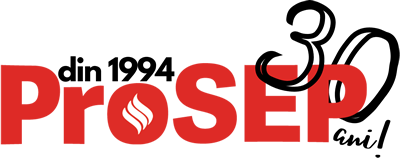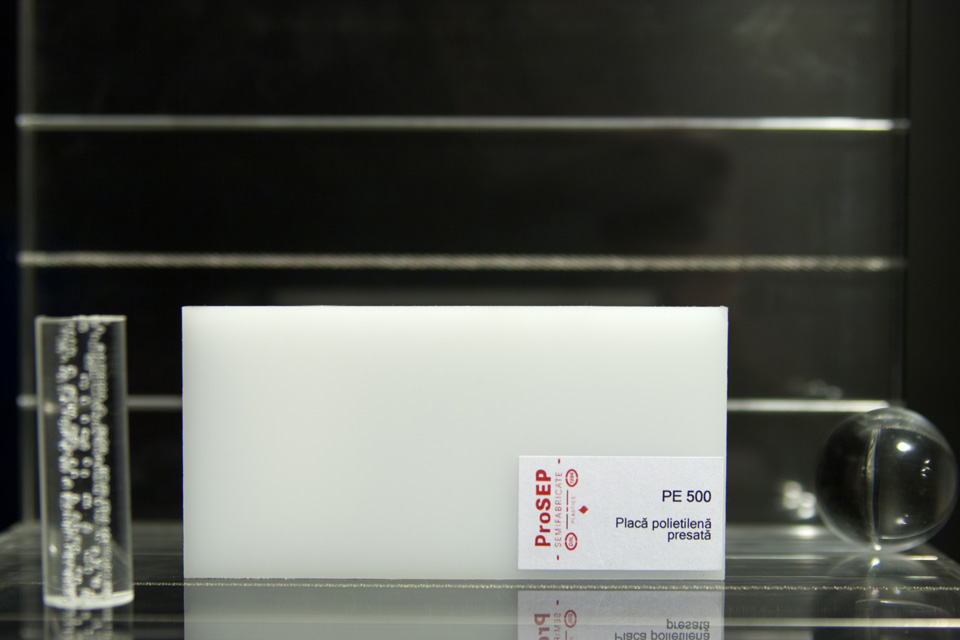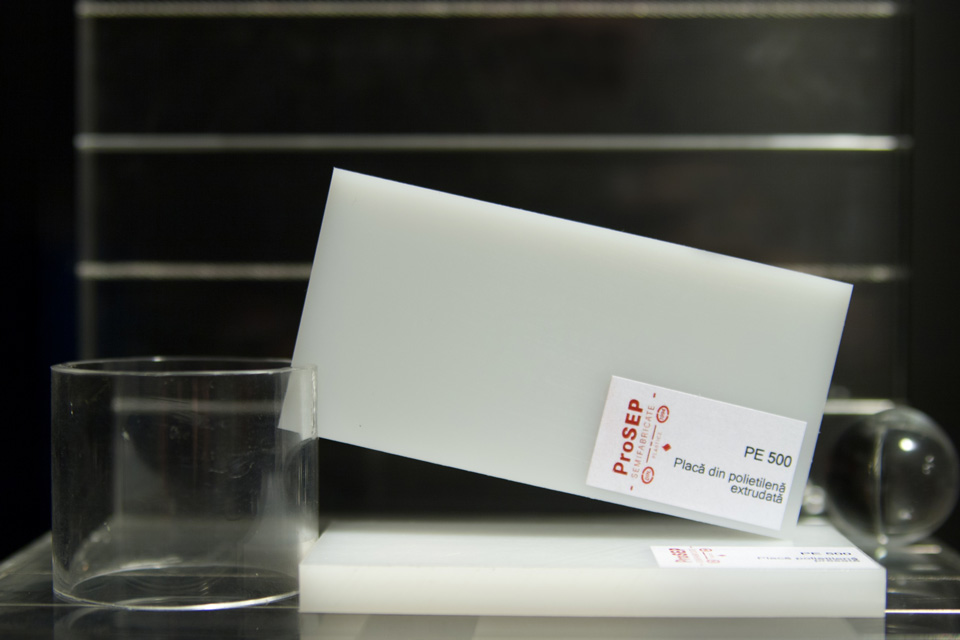PE 500 sheets are white colored sheets, the natural color of polyethylene, and belong to the group of high-density polyethylene sheets PE 500. These sheets can be obtained by two different processes – by pressing or by extrusion.
Due to the increased molecular weight, the mechanical properties of PE 500 sheets are improved compared to PE 100 sheets. Therefore, compared to PE 100 sheets, PE 500 sheets are more resistant to abrasion, have improved resistance to breakage and impact, withstand a wider range of temperatures (-100°C ÷ +80°C) and have improved sliding properties.
The wide range of temperatures it withstands, the certification for food contact as well as the good wear resistance recommend the use of PE 500 sheets for making countertops and worktables in butcheries and slaughterhouses or making various products with applications in industrial refrigeration rooms.
Due to their sliding properties and high wear resistance, PE 500 sheets can be used for plating grain silos, flumes and feed pipes for silos, storage hoppers for various bulk materials, metal tipping bodies for ballast trucks, etc.
The improved mechanical properties combined with the easy machining make the sheets and especially the PE 500 bars the recommended material for the realization of a diversified range of rollers, wheels, guides, etc. used in the construction of machinery for the food industry.
PE 500 sheets are not protected from UV rays and therefore their use is recommended in indoor applications. For certain minimum orders, PE 500 sheets with UV protection can be made.
Standard sizes
Semi-finished products of PE 500 that can be delivered are in the form of sheets, bars and welding electrodes. Available in standard colors: natural, black and green.
PE 500 sheets can be produced by two distinct processes, namely by pressing or by extrusion.
Extruded PE 500 sheets are produced only in natural color and are delivered with thicknesses between 3 mm and 15 mm, and the delivery sizes are 1000×2000 mm or 1500×3000 mm.
The pressed sheets of PE 500 are produced in natural colors, black, green and are delivered with thicknesses between 8 mm and 120 mm, and the standard delivery sizes are 1000×2000 mm and 1250×3000 mm.
Thickness tolerance
PE 500 extruded sheets have a thickness tolerance of ± (0.08 mm + 0.03 x sheet thickness).
A 5 mm thick sheets has tolerances of ± 0.23 mm.
A 10 mm thick sheets has tolerances of ± 0.38 mm.
Pressed PE 500 sheets have the following thickness tolerances:
Sheets with a thickness of 10 – 20 mm have tolerances of 0 / + 3 mm
Sheets with a thickness of 21 – 40 mm have tolerances of 0 / + 5 mm
Sheets with a thickness of 41 – 60 mm have tolerances of 0 / + 6 mm
Sheets with a thickness of 61 – 80 mm have tolerances of 0 / + 8 mm
The sheets with a thickness of 81 – 100 mm have tolerances of 0 / + 10 mm
The sheets with a thickness of 101 – 120 mm have tolerances of 0 / + 12 mm
The sheets with a thickness of 121 – 150 mm have tolerances of 0 / + 14 mm.
Applications and benefits
Benefits:
– good resistance to wear and impact, even at low temperatures;
– wide range of working temperatures (-100°C ÷ +80°C),
– low price compared to other technical plastics or stainless steel
– low specific density (lighter than water);
– easier handling, especially for large parts due to its low weight
– excellent machining;
– excellent chemical resistance;
– low water absorption coefficient;
– approved for food contact;
– low friction coefficient;
Applications:
PE 500 sheets are used in many fields of activity and are increasingly replacing metal and wood in common and special applications.
FOOD INDUSTRY
– countertops and worktables in butcheries and slaughterhouses
– various products used in cold rooms
– components for conveyor belts
– tables for filling lines of bottles, jars, etc.
– plating of lines for bakery products
– feeding funnels for granular or powdery foods
– sliding surfaces for milk cartons in the dairy industry
– butcher blocks for cutting meat
– plating of dough preparation equipment
– guide wheels for bottles, jars, boxes
– bearings for food packaging, transport, processing lines
– gears for food packaging, transport or processing lines
APPLICATIONS IN AGRICULTURE
– plating of tipping bodies that use gravity for unloading
– inner plating of wheat silos
– plating the wear surfaces of silo conveyors
– wear plates of silo discharge flumes
– plating the sliding surfaces of conveyor screws
– plating of flumes in harvesting equipment
– plating of harvest lines
– sliding surfaces when spraying pesticides and herbicides
– making different sliding base plates
SPORT AND RECREATION
– synthetic skating rinks
– base plates for sleds, snowboards or water skis
– plating of chutes
– sliding parts for moving the sets in theaters
– fencing for skating rinks
MATERIAL HANDLING
– side guides for conveyors
– sliding surfaces for transporting bulk powder materials
– components for elevators
– chain guides
– bearings, rollers and wheels for belts carrying abrasive or powdery materials (ores, coal, sand, gravel, fodder, flour, wheat or corn grains, etc.)
– wear-resistant gears on conveyors
Replacement for food-grade stainless steel
Due to the very large price differences between food-grade stainless steel sheets and polyethylene sheets, for applications where the mechanical loads are not high we recommend using polyethylene sheets.
Even if there are some higher mechanical loads, thicker polyethylene sheets can be chosen to withstand the mechanical loads. By this technological solution you can make significant savings, and the cost of the finished product will be reduced a lot.
In general, stainless steel sheets are 10 times more expensive than polyethylene sheets of the same thickness.
Replacement for wood
Wood is traditionally used in the food industry or in kitchens for making kitchen cutting boards, countertops, butcher blocks, worktables, etc. The wood manufacturing of these products favors the development of microorganisms due to the wetting/drying cycles and the fact that water penetrates deep into the wood structure, greatly prolonging the drying period.
The use of polyethylene sheets in the food industry is required by European standards, due to the fact that they they do not absorb water, do not promote the development of microorganisms, can be easily washed and disinfected with any agent no matter how aggressive it is and dries very quickly. As a result, we recommend using PE 500 sheets for all the applications listed above.
Processing
PE 500 sheets can be processed with woodworking machinery.
PE 500 allows the following operations: cutting, turning, drilling, bending, milling and welding.
In the processing manual below you will find all the information needed for processing.
Photo PE 500 – Polyethylene sheets
Request a personalized offer!
Fill in the form below or call us at the phone number: +40 747 776 737
Referring to: PE 500 – Polyethylene sheets





